The “Faktoje” media center, which deals with the verification of facts by evaluating the statements of public officials and politicians, published an extensive text about the “Bulgarian battle in Pustec”, in which, after verifying the facts surrounding the accusations of the president of Macedonian Alliance for European Integration party and former MP, Vasil Sterjovski, evaluates them as true.
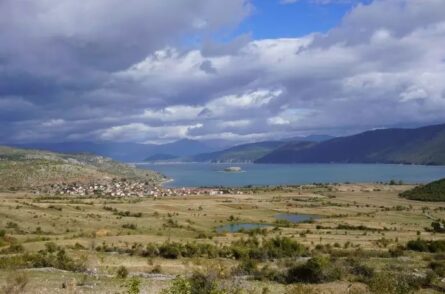
The last battlefield of the historical clash between Bulgaria and North Macedonia seems to have taken place in the beautiful village of Pustec. The accusation of the former deputy in the Albanian parliament, Vasil Sterjovski, of interference and pressure from Bulgaria to artificially create a minority there, despite the public facts, was ignored by the Albanian authorities, despite the doubts that fall on the integrity of the process and the authenticity of the information provided by the citizens under pressure, the center states in the subtitle “Pressures and bribes for the Macedonian minority – the institutions close one eye and turn a deaf ear.”
He adds that the beginning of the process of collecting data for citizens within the framework of this significant statistical operation, has returned attention to the phenomenon of obtaining Bulgarian passports, and the former deputy in the Parliament of Albania, Vasil Sterjovski, president of the Macedonian Alliance for European Integration party, warned of the interference by Bulgaria towards this minority are in order to declare themselves as Bulgarians in the 2023 census.
It states that in October 2023, Albania started the census, during which the Institute of Statistics collects and processes population data, to then publish demographic, economic statistics, etc. Part of this process is the declaration of ethnicity, which is done on the basis of self-declaration.
It is here, according to former MP Sterjovski, that pressure is exerted on the citizens in the villages where there is a majority Macedonian minority.
– We knew that this time Bulgaria would use the only instrument, passports, for people to declare themselves as Bulgarians. From the very beginning of the census, but even before that, the Bulgarian embassy called those persons who applied for a passport by phone and asked them to state in the census that they are Bulgarians and that they speak the Bulgarian language, otherwise, the procedure for extracting a passport will be stopped, “Faktoje” reports a part of Sterjovski’s statement.
In order to understand the alleged intervention against the Macedonian minority in Pustec and beyond, the “Faktoje” center verified the accusations of the former MP Sterjovski, based on the information gathered by him.
– Since the beginning of the census, the Bulgarian ambassador started visiting the areas where there is a Macedonian minority. On the second day of the census, they went to Golo Brdo to distribute gifts. They openly campaigned on the second day of the census, Sterjovski accuses.
On September 15, three days before the start of the census process, the Vice President of Bulgaria, Iliana Jotova, made an official visit to Albania, who met with the Albanian President, the President of the Assembly, the Vice Prime Minister Belinda Balluku and the Minister of Interior Taulant Balla.
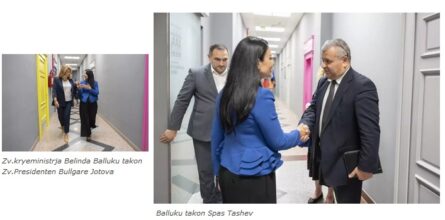
In a post on the social network Facebook, the Bulgarian vice-president says that “she received guarantees from the highest level that the national population census in Albania will be conducted according to the highest European standards, respecting the rights of all ethnic communities, including the Bulgarian one.”
The Bulgarian vice-president called holding the census in Albania a “challenge”, a process she said Bulgaria would follow “with the hope that everything will be fine”.
During the visit, the Bulgarian vice-president also traveled to the areas of Albania where there is a Macedonian minority, such as Golo Brdo, Golemo Ostreni and Elbasan. Citizen Spas Tashev was part of the accompanying delegation of the Bulgarian vice president. The latter, a former advisor to the Bulgarian government, does not hold any official position today.
– On September 30, 2023, this person posted photos from the census list in Albania on his Facebook page, accuses former MP Sterjovski, providing photos from the said post.
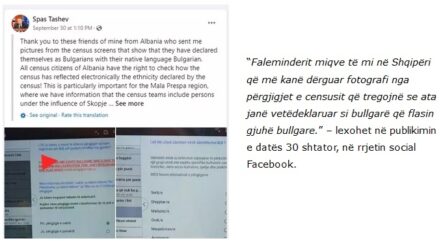
According to Sterjovski, the companion of the Bulgarian vice president to the meetings in the Macedonian minority areas in Albania, Spas Tashev published photos of the answers given by the Albanian citizens in the process of the 2023 census, data that are protected by law as sensitive and personal data.
“Thanks to my friends in Albania who sent me photos of their answers to the census showing that they self-declared as Bulgarians who speak the Bulgarian language. – It says in the post from September 30, on the social network Facebook, where this post is not available now.
What is still public on the web is Spas Tashev’s article according to which “declaring the ethnicity of his Bulgarian compatriots in the Albanian census will depend primarily on Bulgarian diplomacy.”
Making claims about the risk of changing the actual result, this claim was supported by Vice President Jotova, according to Tashev who writes that the “problem” with recording the ethnicity of the population living on the borders of the Republic of Albania became clear in February this year, when INSTAT (Institute for statistics) did a pilot test for the population census.
Tashev, who says that he saw the results of this pilot test, says that “at that time the members of the commissions were under the influence of Skopje and only one Bulgarian was registered in the region of Mala Prespa, although the people in front of us said that they declared their Bulgarian affiliation”.
The center states in the text that “INSTAT (Institute for statistics) never published the data Tashev refers to”.
Another form of pressure and influence that Sterjovski points out is exerted on the Macedonian minority is influence through gifts and open public threats.
“On the day of the beginning of the census in Albania, the Macedonia Foundation issued public threats to the citizens who submitted a request for a Bulgarian passport, says Sterjovski, pointing to the post shared on the social network Facebook by Viktor Stojanov.
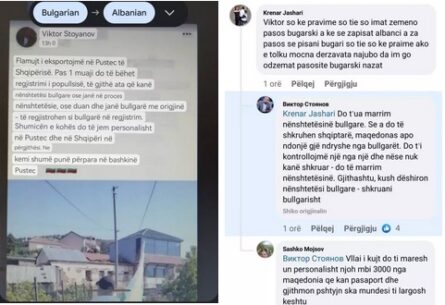
The post, which is still public on Facebook, according to the center, is self-explanatory, because Stojanov publicly calls on citizens in Albania who want to apply for a Bulgarian passport based on origin, to declare themselves Bulgarian in the census, and his posts on Facebook began at least 1 a month before the beginning of the census in Albania, announcing that he would personally be in Pustec during the process.
– This man is from the extreme right of Bulgaria, president of the Macedonia foundation in Sofia, and in recent years we had many problems with him, especially in Pustec. He has come many times, and has had incidents with other right-wing extremists from the ATTACK party. We have suspicions that they may be under Russian influence because we see that they openly support Russia. We warned this person even before the census started, explains Sterjovski, showing photos of public threats that Stojanov gave to Albanians applying for a Bulgarian passport.
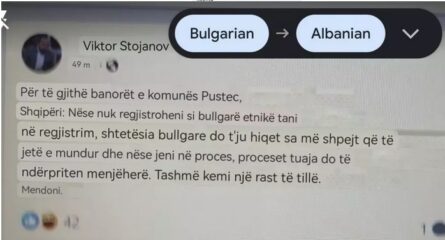
To that, the center adds that on many occasions on the Facebook social network Viktor Stojanov has appeared handing out gifts in the areas of Albania where it is claimed that there is a Bulgarian minority and emphasizes that the dates coincide with those of the census in Albania.
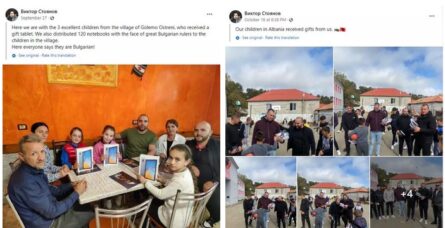
– Among other things, Stojanov also shared a photo of a tablet on which the questions from the census in 2023 and the answers given by the respondents are shown. In the photo you can see the tablet used by INSTAT (Institute of Statistics) to collect population data for the 2023 census, as well as the ethnicity question, for which the citizen Gezim, who gives the answers, declared himself Bulgarian, “Faktoje” points out.
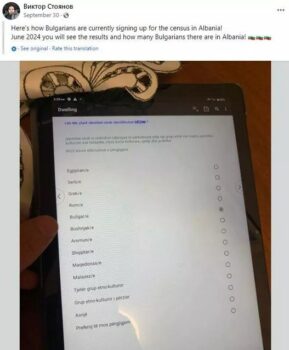
This, according to former MP Sterjovski, was a great pressure on those citizens who may be in the process of obtaining Bulgarian citizenship, who consider that the information they provide in response to the INSTAT census is not secret and “can be used against them”.
The mayor of the municipality Pali Kolefski stated that this person did not come to Pustec during the census.
– I saw what you wrote on social networks. We reported this person to the Albanian police that during the census he should not influence or be present at least during that period. Because it affected badly. We filed a report if he tried to come, but he didn’t come near here at all. – Pali Kolefski told “Faktoje”.
A request not to allow Viktor Stojanov to enter Albania during the census was also sent by the party Macedonian Alliance for European Integration – reports Sterjovski – but it was not taken into account by the Albanian authorities and Stojanov entered Albania undisturbed.
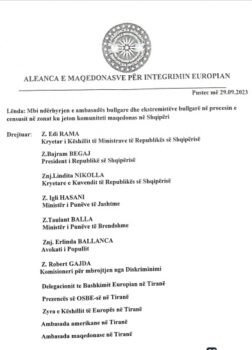
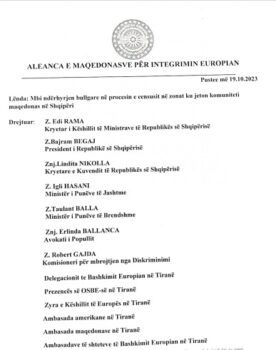
The reliability of the process is even more difficult when the data on the citizens of Pustec are published by the media before the end of the INSTAT data collection.
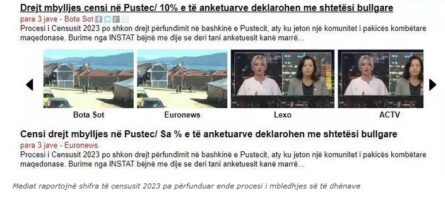
EUROPEAN STANDARDS AND THE LAW OF MINORITIES
According to Vasil Sterjovski, all these forms of pressure, but especially that of “finding by name” the persons who declared themselves Bulgarian or not in the census, lead to a distortion of the result. This is because the lack of trust in a regular and secret population census process results in the possibility of false answers.
“Faktoje” reminds us that according to the Framework Convention for the Protection of National Minorities of the Council of Europe, free self-identification within the population census and other data collection processes begins with the free decision of the individual.
-The free self-identification of a person can be questioned only in rare cases, such as when it is not based on good faith. – writes in the Convention of the Council of Europe.
The Council of Europe document further emphasizes that “the registration of self-identification in the case of minority identity should not be imposed from the outside.”
The two basic criteria of the census through self-identification are violated, emphasizes Sterjovski.
Vasil Sterjovski calls this action by Bulgaria part of its strategy for the artificial assimilation of Macedonian minorities in the region. Proof of that, according to him, is the fact that although in INSTAT censuses the issue of ethnicity has always been self-identification, in the 2011 census not a single Bulgarian appeared in any district of Albania.
– The Bulgarian minority was recognized for the first time by the amendments to the law on minorities in 2017, at a time when there was no such minority in Albania. According to this law, every area where 20% of the population belongs to a minority group has the obligation to use the language of that minority in schools, official documents, road signs. This is what Bulgaria wants to achieve, Sterjovski believes.
After verifying the facts, the “Faktoje” media center, which is the only fact-checking media in Albania that encourages and promotes responsibility based on the right to information and transparency, concludes the article with the conclusion that Sterjovski’s accusations are true.
-And regardless of the goal and strategy chosen by the Bulgarian state, what the posts on the social network Facebook show is the influence exerted on the inhabitants of the areas where the Macedonian minority lives to declare themselves as Bulgarians in the census and the threats of not giving or revocation of Bulgarian citizenship for those who have acquired this right. Based on public data, we consider the accusations of former MP Vasil Sterjovski to be true, concludes “Faktoje” at the end.
